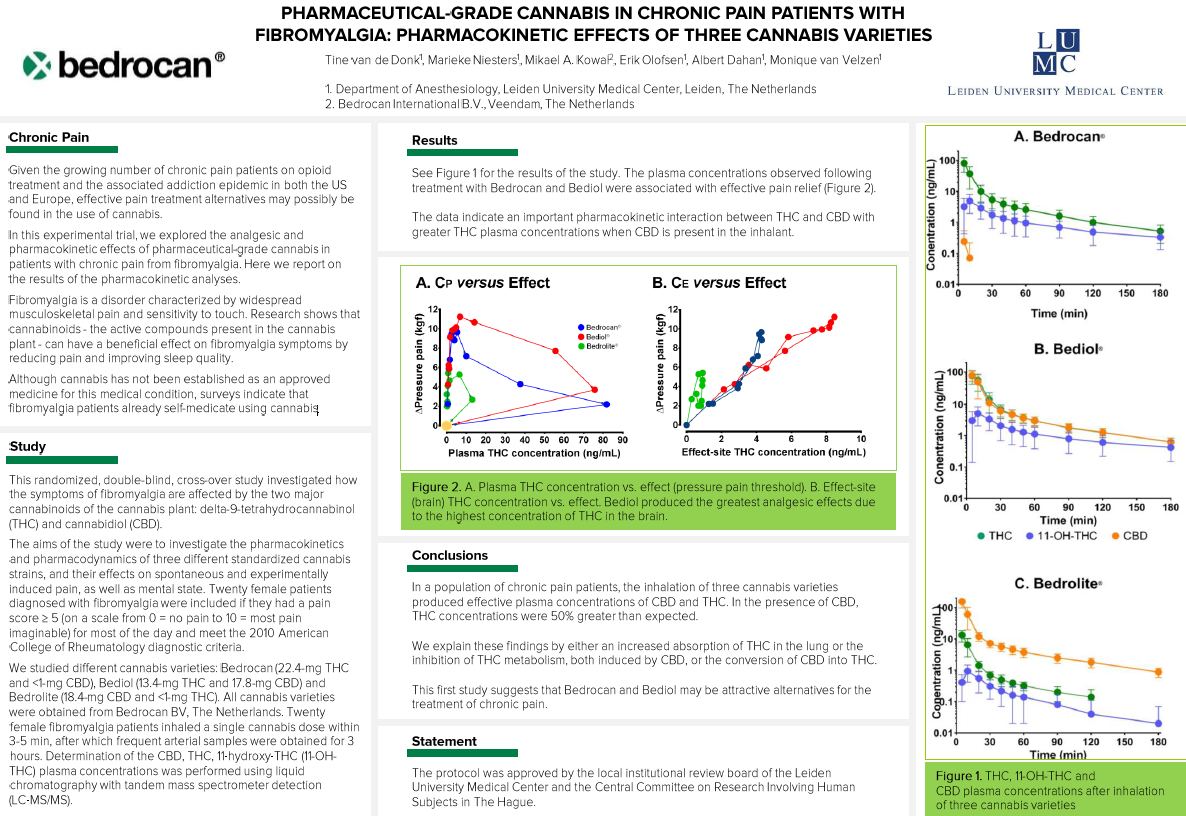CBD can have a strengthening effect on the THC level in the blood. This was observed in data from a clinical study with fibromyalgia patients. A poster presentation about this matter gathered a large and engaged group of researchers and regulators at the ICRS congress last June. The ICRS congress is a leading scientific conference where international scientists present their findings in the field of cannabinoid research.
Previous research has shown that administering THC together with CBD can help reducing the undesirable side effects of THC, especially those related to increased anxiety. However, recent clinical and psychopharmacological research shows that co-administration of THC and CBD can lead to additional, unexpected effects.
Specifically, a recently published clinical study conducted at the Leiden University Medical Center, with the support of Bedrocan, compared the blood levels of THC in chronic pain patients after the administration of three cannabis chemovars (varieties): Bedrocan® (THC 22% | CBD <1.0%), Bediol® (THC 6.3% | CBD 8%), and Bedrolite® (THC <1.0% | CBD 9%).
Bedrocan’s research coordinator Mikael Kowal presented the results at the ICRS congress and there was great interest in his analyses. “The findings from our clinical study regarding the complex interactions between THC and CBD in the body are novel and were surprising to many.”
Knowledge
“Apparently, the effect of CBD increasing THC concentrations in the blood was discovered by one researcher in the early days of creating the formulation of Sativex. However, at that time this finding was difficult to explain, due to lack of sufficient knowledge on the workings of CBD. Currently, we seem to be the first to have this data published and similar results are being found in animal research.”

In the case of Bediol, the mixed THC/CBD cannabis chemovar, the blood levels of THC were about 50% higher than expected from the administered THC dose. Moreover, a similar effect was observed in a psychopharmacological study conducted with healthy cannabis users at the University of Sydney, in which higher THC levels were found in the blood of subjects who received cannabis containing equal amounts of THC and CBD, than in the case of cannabis containing an equal dose of THC, but without CBD.
The exact mechanism by which this effect occurs is still not clear. Possible explanations include an increased absorption of THC in the lungs or the inhibition of THC metabolism, both induced by CBD, or the conversion of CBD into THC. In any case, knowledge of these pharmacokinetic THC-CBD interactions can help physicians and patients in establishing a proper therapeutic dose of cannabis to treat their symptoms. Further research is needed to confirm this, however it is possible that lower doses of THC are required when co-administering it with CBD, in order to achieve symptom control of a particular disease.
Thank you readers for your interest in the article. Please like and comment so we have more motivation to write articles

0 Comment:
Post a Comment